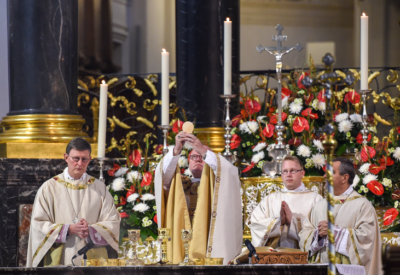 Recently a parishioner asked me, given all the current news coverage of what Catholics believe about the Eucharist, he noticed that sometimes the question is framed as “Do Catholic believe in Transubstantiation?” but other times as “Do Catholics believe in the Real Presence of Jesus in the Eucharist?” While he certainly had heard both terms, he wondered if they were the same question. And the answer is a qualified “yes.” Why “qualified?” Because the “Real Presence” is a theological term to refer to the reality of the Eucharist while “transubstantiation” is a philosophical term that expresses an understanding of how that reality occurs, via the change in substance without a corresponding change in accidents.
Recently a parishioner asked me, given all the current news coverage of what Catholics believe about the Eucharist, he noticed that sometimes the question is framed as “Do Catholic believe in Transubstantiation?” but other times as “Do Catholics believe in the Real Presence of Jesus in the Eucharist?” While he certainly had heard both terms, he wondered if they were the same question. And the answer is a qualified “yes.” Why “qualified?” Because the “Real Presence” is a theological term to refer to the reality of the Eucharist while “transubstantiation” is a philosophical term that expresses an understanding of how that reality occurs, via the change in substance without a corresponding change in accidents.
Pause for a moment and think about the goal if you were expressing your belief in the Catholic understanding of the Eucharist, would you want to express the reality of the what the Eucharist is, or how it came to be that reality from simple bread and wine. Hopefully you want to express the reality. As for the “how”…. given that the Eucharist is a mystery, by definition, it will evade our attempts to explain the “how” not that our human instinct to explain won’t give it a try.
During my seminary course work, a wise professor cautioned against spending time and energy in attempting to explain mystery. He used the example of Jesus’ humanity and divinity somehow united together. “And the Word was made flesh.” Or if you prefer “The Word became flesh.” (John 1:14). He offered that all attempts to explain “how” ended up as a Christological heresy, tripped up by “Word”, “become” or “flesh. ” Such is the reward for thinking one can explaining mystery. Attempting to explain the mystery of the Eucharist in “how” terms has often resulted in the same reward.
As noted above “transubstantiation” is a philosophical term that expresses an understanding of how that reality occurs, via the change in substance without a corresponding change in accidents. Each one of the emphasized terms is philosophical and specifically rooted in Aristotelian philosophy – and they don’t mean what they mean in modern English. Why Aristotelian philosophy? I would suggest that it was because the works of Aristotle had been long lost to the West which relied solely on Latin language books. The works of Aristotle existed in Ancient Greek, Syriac and Arabic. Over a 100 year period, with significant contributions from the Dominican William of Moerbeke, the complete works were available in Latin to Thomas Aquinas and his teacher St. Albert the Great. It became the philosophical underpinning of Thomas’ Summa Theologicae.
Like all philosophical systems, there are limitations when it comes to explaining “how.” To the modern mind Aristotelian philosophy is unable to explain “how” water can change into steam. The Third Session of the Council of Trent recognized the limitations, when in its 13th Session (1551) issued the “Decree Concerning the Most Holy Sacrament of the Eucharist.” Chapter 1 is on “The Real Presence of Our Lord Jesus Christ in the Most Holy Sacrament of the Eucharist”; Chapter 4 is a brief paragraph on “Transubstantiation” which writes in reference to the change of bread and wine into the Real Presence, the change is “aptly called transubstantiation.” I would suggest that is their way of saying, “it will do… besides it’s a mystery.”
It is worth noting that the preamble states why the decree is being issued: “for the purpose of setting forth the true and ancient doctrine concerning faith and the sacraments, and of applying a remedy to all the heresies and the other most grievous troubles by which the Church of God is now miserably disturbed and rent into many and various parts.” In other words, it is addressed to the Protestant Reformers denial of the “true and ancient doctrine” of the Holy Eucharist.
What was the “lead” article? Chapter 1 on the Real Presence – the true and ancient belief of the Church. What about the always vexing question of “how”? Perhaps St. Ambrose said it best: “If the word of the Lord Jesus is so powerful as to bring into existence things which were not, then a fortiori those things which already exist can be changed into something else” ( De Sacramentis, IV, 5-16).